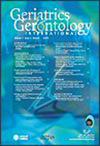Causal association between sarcopenia and cognitive impairment contributes to the muscle–brain axis: A bidirectional Mendelian randomization study
Abstract
Aim
There is a growing body of evidence suggesting a correlation between sarcopenia (SP) and cognitive impairment (CI), but with conflict. This study employed a bidirectional Mendelian randomization (MR) approach to ascertain the causality between SP and CI.
Method
This study looked at whether there might be causality between SP and CI by using a bidirectional MR analysis on the GWAS summary datasets, which anyone can publicly access. The primary analysis employed inverse variance weighting (IVW), with MR-Egger, weighted median, and mendelian randomization pleiotropy residual sum and outlier (MR-PRESSO) serving as supplements. Multiple sensitivity analyses were performed to enhance the stability of the results, which encompassed heterogeneity tests and pleiotropy tests.
Results
Appendicular lean mass (ALM), walking pace (WP), and grip strength (GS) were found to be causally connected to cognitive performance in forward MR analysis. In the reverse MR study, cognitive performance also had a causal impact on ALM and WP. Additionally, we discovered comparable outcomes in the replication samples, which strengthens the validity of our findings.
Conclusions
The results of our MR investigation revealed a definitive cause-and-effect association between SP and CI. Our findings provide additional supporting evidence for the muscle–brain axis, which may suggest that muscle strengthening has a significant impact on the management and avoidance of CI. Geriatr Gerontol Int 2025; 25: 116–122.

 求助内容:
求助内容: 应助结果提醒方式:
应助结果提醒方式:


